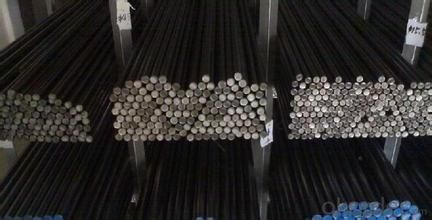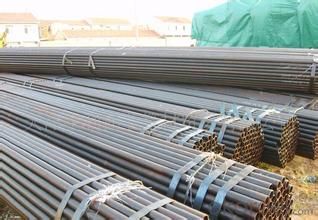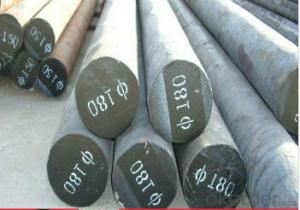Spring Steel Round Bars Grade 55cr3
- Loading Port:
- China Main Port
- Payment Terms:
- TT or LC
- Min Order Qty:
- -
- Supply Capability:
- -
OKorder Service Pledge
OKorder Financial Service
You Might Also Like
Product Basic Information:
Material | ASTM SAE 5155 | ||
Chemical Composition | Mechanical Properties(In Quenched & Tempered State) | ||
C | 0.52-0.60 | Tensile strength(MPA) | 1078 |
Si | 0.17-0.37 | Yield strength (MPA) | 1225 |
Mn | 0.65-0.95 | Elongation(δ5/%) | 9 |
Cr | 0.65-0.95 | Reduction in Area (ψ/%) | 20 |
Mo | - | Impact (J) | - |
P | ≤0.035 |
Hardness |
- |
S | ≤0..035 | ||
Cu | 0.25 | ||
Ni | 0.35 | ||
Product Sales Information:
Material | bearing Steel round bar |
Size | Diameter:20mm-1000mm Length:500mm-6000mm |
Origin place | Made In China |
Delivery Condition | Hot rolled,cold drawn,forged |
Surface require | Black,grinding,bright,polish |
Heat treatment | Quenched,Tempered,annealed |
Packing | seaworthy packing ,wooden case ,carton,woven bag or at client's requires |
Delivery time | In 10-50 days |
Trade Term | EXW,FOB,CIF |
Payments | T/T or L/C at sight |
Port | China main Port,such as shanghai,Dalian,Shenzhen port. |
MOQ | 1 Ton |
FAQ of Spring Steel Round Bars:
①How is the quality of your products?
Our products are manufactured strictly according to national and internaional standard.Guaranteed: If products’ quality don’t accord to discription as we give or the promise before you place order, we promise 100% refund.
②How about price?
Yes, we are factory and be able to give you lowest price below market one, and we have a policy that “ for saving time and absolutely honest business attitude, we quote as lowest as possible for any customer, and discount can be given according to quantity”,if you like bargain and factory price is not low enough as you think, just don’t waste your time.Please trust the quotation we would give you, it is professional one.
③Why should you chose us?
Chose happens because of quality, then price, We can give you both.Additionally, we can also offer professional products inquiry, products knowledge train(for agents), smooth goods delivery, exellent customer solution proposals.Our service formula: good quality+good price+good service=customer’s trust
SGS test is available, customer inspection before shipping is welcome, third party inspection is no problem.
Any question, pls feel free to contact us !
Spring Steel Round Bars Images


- Q:How does special steel perform in high-speed machining operations?
- Special steel is specifically designed to withstand high-speed machining operations with exceptional performance. Its unique composition and properties, including high hardness, heat resistance, and wear resistance, allow it to maintain its strength and durability even under extreme cutting speeds and temperatures. This enables special steel to deliver superior machining efficiency, precision, and surface finish, making it an ideal choice for high-speed machining operations.
- Q:What are the different testing methods for special steel?
- There are various testing methods for special steel, including hardness testing, tensile testing, impact testing, metallographic testing, and non-destructive testing. Each method helps assess different properties of the steel, such as strength, toughness, microstructure, and defects, ensuring its quality and suitability for specific applications.
- Q:How does special steel contribute to the manufacturing of precision instruments?
- Special steel plays a crucial role in the manufacturing of precision instruments. Its unique characteristics and properties make it an ideal material choice for these applications. Firstly, special steel offers exceptional strength and durability, allowing precision instruments to withstand extreme conditions, heavy loads, and repetitive use. This ensures the longevity and reliability of these instruments, which is vital in critical industries such as aerospace, automotive, and medical. Moreover, special steel has excellent corrosion resistance, preventing the instruments from deteriorating over time. This is especially important for precision instruments that are exposed to various elements, chemicals, or moisture during their operation or storage. Special steel also provides high thermal stability, enabling precision instruments to maintain their accuracy in different temperature environments. This is vital for instruments that are used in industries where temperature fluctuations can affect their performance, such as laboratories or manufacturing plants. Additionally, special steel can be customized and tailored to meet specific design requirements. It can be easily machined, formed, or welded into intricate shapes and parts, allowing manufacturers to create precision instruments with complex geometries and tight tolerances. This level of precision is crucial for instruments used in fields like metrology, microscopy, or nanotechnology. Furthermore, special steel offers excellent magnetic properties, which can be advantageous for precision instruments that rely on magnetic fields for their operation. This includes instruments like magnetic resonance imaging (MRI) machines, compasses, or magnetometers. In conclusion, special steel contributes significantly to the manufacturing of precision instruments by providing strength, durability, corrosion resistance, thermal stability, customization options, and magnetic properties. These characteristics ensure the performance, accuracy, and longevity of precision instruments, making them indispensable in various industries.
- Q:What are the different impact-resistant grades of special steel?
- Steel alloys known as impact-resistant grades are designed to withstand high impact and shock loads without fracturing or deforming. These grades of steel are crucial in industries like construction, mining, automotive, and defense, where resistance to impact and toughness are essential. Numerous impact-resistant grades of special steel are available, each with its own unique characteristics and properties. Some commonly used grades include: 1. AR400: This steel has a hardness of 400 Brinell (HB) and is highly resistant to abrasion and impact. It finds applications in bucket liners, crushers, and hoppers where wear resistance is critical. 2. AR500: With a hardness of 500 HB, AR500 steel offers even greater resistance to wear and impact compared to AR400. It is frequently used in heavy machinery, mining equipment, and armored vehicles. 3. AR600: This steel boasts a hardness of 600 HB, making it one of the toughest and most impact-resistant options. It is ideal for applications that require extreme wear resistance and durability, such as chutes, conveyors, and ballistic protection. 4. T-1: T-1 steel is a high-strength, low-alloy (HSLA) steel that delivers excellent impact resistance and toughness. It is commonly utilized in structural components, heavy equipment, and offshore drilling rigs, where high strength and toughness are essential. 5. QT or Quenched and Tempered Steels: These steels undergo specific heat treatment to enhance their toughness and impact resistance. They are popular in applications that demand high strength, toughness, and impact resistance, such as gears, shafts, and armor plates. It is important to note that the impact resistance of a specific steel grade depends not only on its composition but also on factors like heat treatment, fabrication techniques, and design considerations. Therefore, consulting steel manufacturers or experts is crucial in determining the most suitable impact-resistant grade for a particular application.
- Q:How does special steel contribute to the manufacturing of structural components?
- Special steel contributes to the manufacturing of structural components by offering superior strength, durability, and resistance to corrosion. It provides structural integrity and stability in various applications such as buildings, bridges, and machinery, ensuring the safety and longevity of these structures. Additionally, the specific properties of special steel, such as its ability to withstand extreme temperatures or high pressure, make it an ideal material for critical structural components, thereby enhancing overall performance and reliability.
- Q:How is special steel used in the chemical industry?
- Special steel is used in the chemical industry primarily for its corrosion resistance, high temperature stability, and durability. It is widely utilized in the construction of chemical processing equipment, such as reactors, tanks, and pipelines, to withstand harsh and corrosive environments. Additionally, special steel alloys are employed in the production of catalysts, which are essential for various chemical reactions. Overall, special steel plays a crucial role in ensuring the safety, efficiency, and longevity of chemical processes within the industry.
- Q:How does special steel contribute to the industrial equipment industry?
- The industrial equipment industry greatly relies on special steel for its superior strength, durability, and ability to withstand harsh conditions. Specially engineered steel alloys possess exceptional properties that suit a wide range of applications in industrial equipment. One of the main advantages of special steel is its ability to endure high temperatures and pressure, making it ideal for producing components like boilers, turbines, and heat exchangers. With its high heat resistance, special steel ensures efficient and reliable operation in demanding environments, enhancing performance and safety. Moreover, special steel is well-known for its excellent corrosion resistance, making it suitable for manufacturing equipment that encounters corrosive substances. This includes chemical processing equipment, oil and gas pipelines, and marine structures. By utilizing special steel in these applications, the industrial equipment industry can prolong operational lifetimes, reduce maintenance costs, and minimize the risk of catastrophic failures. Special steel also contributes to the industry by enabling the production of equipment with superior mechanical properties. Its unique composition and heat treatment processes increase strength, toughness, and wear resistance. Consequently, industrial equipment made from special steel can handle heavy loads, endure extreme conditions, and provide long-lasting performance. Furthermore, special steel alloys can be customized to meet specific requirements, allowing for the production of tailor-made components. This flexibility empowers the industrial equipment industry to design and manufacture equipment that precisely meets the diverse needs of sectors such as aerospace, automotive, energy, and construction. The versatility and adaptability of special steel play a crucial role in driving innovation and technological advancements within the industry. To summarize, special steel significantly contributes to the industrial equipment industry by providing exceptional strength, durability, resistance to harsh conditions, and customized solutions. Its unique properties make it an essential material for manufacturing a wide range of equipment, ultimately enhancing performance, reliability, and safety across various sectors.
- Q:What is the significance of carbon content in special steel?
- The carbon content in special steel is significant because it determines the steel's hardness, strength, and overall performance. Higher carbon content results in increased hardness and strength, making the steel suitable for applications requiring durability and resistance to wear and tear. On the other hand, lower carbon content enhances the steel's ductility and formability, making it more suitable for shaping and molding processes. Therefore, carbon content plays a crucial role in tailoring the properties of special steel to meet specific industrial requirements.
- Q:What are the environmental impacts of manufacturing special steel?
- Manufacturing special steel has significant environmental impacts due to its energy-intensive production process and the extraction of raw materials. The production of special steel requires high temperatures and uses large amounts of fossil fuel-based energy, resulting in substantial greenhouse gas emissions contributing to climate change. Additionally, the extraction of iron ore and other raw materials for steel production can lead to deforestation, habitat destruction, and water pollution. The disposal of steel waste and byproducts also poses challenges, as it can contaminate soil and water sources. Therefore, the environmental impacts of manufacturing special steel must be carefully managed and mitigated through sustainable practices and technologies.
- Q:What are the different peening techniques used for special steel?
- There are several peening techniques used for special steel, including shot peening, ultrasonic peening, laser peening, and cavitation peening. Each technique involves using different methods and tools to introduce controlled compressive stresses into the material's surface, improving its mechanical properties and resistance to fatigue, stress corrosion, and other forms of degradation.
1. Manufacturer Overview |
|
|---|---|
| Location | |
| Year Established | |
| Annual Output Value | |
| Main Markets | |
| Company Certifications | |
2. Manufacturer Certificates |
|
|---|---|
| a) Certification Name | |
| Range | |
| Reference | |
| Validity Period | |
3. Manufacturer Capability |
|
|---|---|
| a)Trade Capacity | |
| Nearest Port | |
| Export Percentage | |
| No.of Employees in Trade Department | |
| Language Spoken: | |
| b)Factory Information | |
| Factory Size: | |
| No. of Production Lines | |
| Contract Manufacturing | |
| Product Price Range | |
Send your message to us
Spring Steel Round Bars Grade 55cr3
- Loading Port:
- China Main Port
- Payment Terms:
- TT or LC
- Min Order Qty:
- -
- Supply Capability:
- -
OKorder Service Pledge
OKorder Financial Service
Similar products
New products
Hot products
Related keywords































